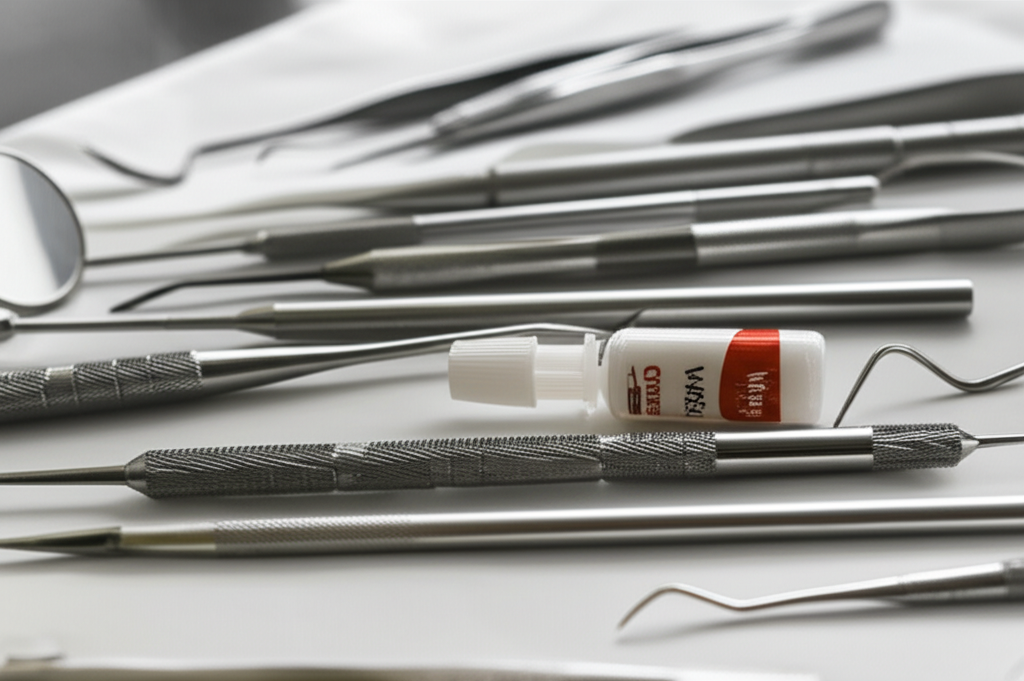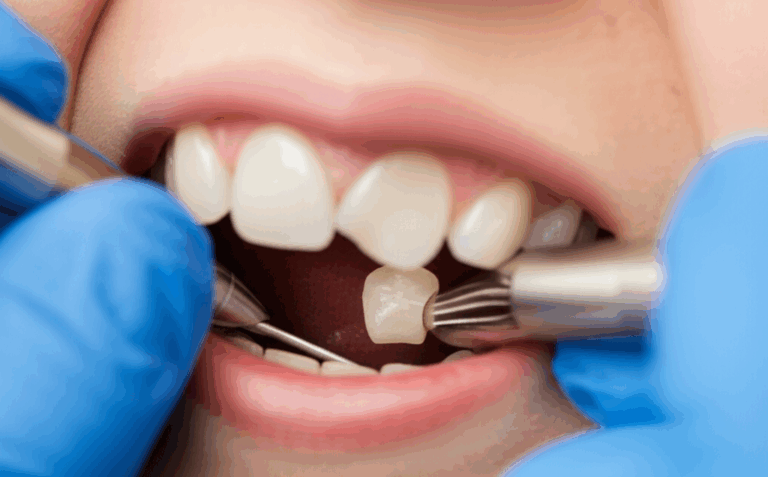
What Type of Glue Do Dentists Use? Understanding Specialized Dental Adhesives and Cements
That odd, shaky feeling when a crown comes loose can make anyone nervous. Or maybe you’ve wondered while sitting in the dentist’s chair, “What’s that stuff they just put on my tooth? Is it super glue?” If you’re asking what type of glue do dentists use, you’re definitely not alone. Many people ask this question—it’s super important for keeping your teeth safe and healthy.
The quick answer? Dentists don’t use anything from your kitchen or toolbox. The “glue” they use is really a special group of materials made just for your mouth. These dental glues are built to hold, seal, and protect your teeth while lasting for years of chewing and everything else life throws at you.
This guide will go over the basics. We’ll explain the science behind dental glues, talk about the kinds and uses, and give you easy facts so you know what to expect—and what to do if a crown or filling ever pops off.
In This Article
- Why Can’t You Use Regular Glue in Your Mouth?
- What Are Dental Adhesives and Cements, Really?
- Types of Dental “Glue” and Where Dentists Use Them
- Which Adhesive for Which Dental Job?
- How Do Dentists Pick the Right Glue?
- Making Your Dental Work Last
- What to Do If Something Falls Out
- The Future of Dental Adhesives
- Key Takeaways: What You Should Remember
Why Can’t You Use Regular Glue in Your Mouth?
Let’s clear up a big myth: Super glue and other regular glues are NOT safe or useful in your mouth. It might seem like a good idea in an emergency—but using craft glue, school glue, or hardware glue on your teeth can hurt them.
Here’s why:
- Toxic: Normal glues are not made for inside your mouth. They can hurt your gums, burn soft tissues, and give off bad fumes.
- Not Strong Enough: Chewing, spit, and temperature changes can easily break down household glues. At best, they break fast; at worst, they trap germs or make things worse.
- Can Hurt Your Tooth: Trying to glue something at home can damage nearby teeth. You could get an infection or break your tooth even more—and it might be harder for your dentist to fix.
Dentists use only special dental adhesives and cements made just for teeth. Don’t try to fix things yourself—call your dentist instead.
What Are Dental Adhesives and Cements, Really?
When a dentist talks about “dental glue,” they don’t just use one kind. They have several special materials: adhesives, bonding liquids, and cements.
Here’s what those mean in plain language.
Dental Adhesives (Bonding Agents)
Think of these as the “preparation” that gets the tooth ready for something, like a filling, veneer, or braces bracket, to stick. They are made to work with the hard part of the tooth (enamel) and the softer part underneath (dentin) to help keep things attached.
Dental Cements
Dental cements are kind of like the mortar between bricks. In dental work, they stick (or “lute”) crowns, bridges, inlays, or braces bands to your tooth. Cements also fill tiny gaps between the tooth and the crown to keep germs and moisture out.
> Analogy: If your tooth was a wall, the crown would be a tile and dental cement would be the grout holding it and sealing the wall.
Luting Agents
This just means cements that glue crowns, bridges, or inlays onto your teeth.
Types of Dental “Glue” and Where Dentists Use Them
Let’s look at the different “glues” dentists use and what they’re for:
1. Resin Cements and Bonding Agents
These are often the “all-stars” for strength and looks.
- How They Work: The dentist preps your tooth with a mild acid (etching), uses a primer (like prepping wood before paint), then puts on the resin cement. Special light may “harden” it right away.
- Used For: Veneers, tooth-colored fillings, ceramic or Zirconia crowns, braces.
- Types: “Self-etch,” “etch-and-rinse,” and “universal” adhesives—different ways for different jobs.
Why Use: Strongest stick, lower risk of leaks, and can match tooth color well.
2. Glass Ionomer Cements (GICs) and Resin-Modified GICs (RMGICs)
Glass ionomer cements are reliable, especially for kids’ dental work and fillings near the gums.
- How They Work: They glue themselves to the tooth and even slowly let out fluoride.
- Used For: Metal crowns, fillings for baby teeth, liners under fillings, quick fixes.
- Why Use: Give off fluoride (helps stop new cavities), gentle on sore spots, more forgiving in a slightly wet mouth than some resins.
Resin-Modified Glass Ionomers add a bit of resin for extra toughness.
3. Older Cements: Zinc Phosphate & Polycarboxylate
These “old-school” glues still have their uses.
- How They Work: Mostly stick by holding on to tiny rough spots in the tooth (not so much by chemical bonding).
- Used For: Metal crowns, bridges, filling bases, older types of work.
- Why Use: Trusted for a long time, cheaper, and gentle on nerve tissue.
You probably won’t see these much for new ceramic work.
Which Adhesive for Which Dental Job?
Every dental job needs a glue that matches its job—just like you wouldn’t use wood glue on fabric.
Let’s look at a few common ones:
Crowns and Bridges
Gold, porcelain, zirconia—what it’s made of matters!
- Ceramics and Tooth-Colored Crowns: Resin cements are strong and unseen, great for see-through or white-colored crowns.
- Metal Crowns: Glass ionomer, RMGIC, or the older kinds may work best.
The choice depends on the crown material, where in your mouth it is, and any allergies. Your dentist often teams up with a crown and bridge lab to pick the best cement.
Veneers
For those thin “covers” on front teeth, dentists use resin cements. These keep the veneer on and make sure it looks natural.
Braces (Orthodontic Brackets)
Ever wonder how brackets stay on during pizza night? Special bonding agents keep them firmly stuck but easy to take off later.
Dental Fillings (Composites)
Modern white fillings use adhesives to keep them hard and stuck to your tooth.
Dental Sealants
Sealants are like a raincoat for back teeth. The dentist “paints” on a liquid resin that hardens into a shield, blocking germs.
Root Canal Treatment
In a root canal, the last seal matters most. Here, safe sealers fill up the root so germs can’t sneak back in later.
How Do Dentists Pick the Right Glue?
Dentists don’t just grab any old “glue.” They think about:
- Restoration and Materials: A see-through crown needs different glue than a gold one.
- Strength Needed: Some teeth get chewed on more, others have to look invisible up front.
- Looks: Clear or white cements are key for front teeth.
- Allergies or Sensitivities: Some people react to certain materials.
- Moisture: Some glues need the tooth totally dry, others can handle some wetness.
- Your Needs: Weak teeth, lots of cavities, history of reactions? Your dentist picks what works best for you.
Note About Dental Labs
A top dental lab—like a good digital dental lab or veneer lab—helps your dentist get things to fit and match just right with the best glue for you.
Making Your Dental Work Last
Had a crown, filling, or new veneer put in? Here’s how to make it last:
How Long Do Dental Glues Last?
With good care:
- A well-cemented crown or bridge: 10–15 years (or more!).
- Veneers with resin cement: often 10–20 years.
- Tooth-colored fillings: about 5–10 years or more.
Keep them longer by:
- Great Cleaning: Brush and floss every day.
- Careful Eating: Don’t chew sticky candy or ice.
- No Home Fixes: Don’t mess with loose crowns—call your dentist.
- Checkups: Your dentist can spot tiny problems before they get big.
Signs Something Is Wrong
Watch out for:
- A crown feeling loose or “off”
- Sharp edges on fillings
- Sensitivity to heat/cold where dental work meets your tooth
- Food caught between dental work and teeth
If you notice any, don’t panic—but call your dentist.
What to Do If Something Falls Out
If a crown comes off or you find a veneer on your pillow, here’s what to do:
BIG WARNING
Don’t use super glue, craft glue, or any non-dental product to fix it. These are NOT safe inside your mouth and might destroy your crown or hurt your tooth/gum.
The Future of Dental Adhesives
Dentistry is always getting better!
Scientists are working on special glues that aren’t just stronger—they might help teeth heal and even fight germs. Soon we could have “smart” glues that help rebuild tooth enamel or block infections.
The materials for crowns and fillings also keep improving. If you’re curious about new stuff, check out what’s coming from a 3d dental lab or see how custom dental work is made at a top china dental lab.
Key Takeaways: What You Should Remember
To wrap up, here’s what matters most:
- Dental “glue” isn’t like home glue: Dentists use special adhesives and cements, each picked just for you.
- Household glues are dangerous: Never try to fix dental work with any regular glue.
- Every tooth and dental job is different: Dentists and labs work together to choose the safest, strongest, and most natural solution.
- Take care of your dental work: Good cleaning and regular visits make it last.
- If anything feels loose, see your dentist: Fast help stops bigger problems.
Still Have Questions? Let’s Empower You
Remember: You’re not alone. If you’re worried about dental “glue,” something doesn’t feel right, or you’re just curious—ask your dentist! No question is too small when it comes to your health.
Book a checkup or visit your dentist. If you’ve had crowns, veneers, or other repairs, ask them about the glue they used and why. Knowing about your dental care helps keep your smile strong for life.
Smiles are made to last—especially when you know what’s holding them together.








